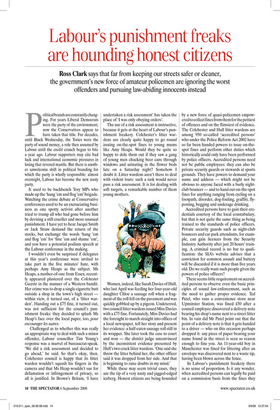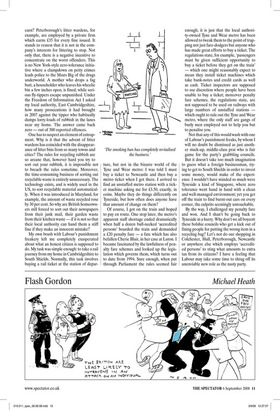Labour’s punishment freaks are hounding honest citizens
Ross Clark says that far from keeping our streets safer or cleaner, the government’s new force of amateur policemen are ignoring the worst offenders and pursuing law-abiding innocents instead Political brands are constantly changing. For years Liberal Democrats were the party of the environment; now the Conservatives appear to have taken that title. For decades, until Black Wednesday, the Tories were the party of sound money, a role then assumed by Labour until the credit crunch began to bite a year ago. Labour supporters may cite bad luck and international economic pressures in losing that revered mantle. But there is another unwelcome shift in political branding for which the party is wholly responsible: almost overnight, Labour has become the new nasty party.
It used to be backbench Tory MPs who made up the ‘hang ’em and flog ’em’ brigade. Watching the crime debate at Conservative conferences used to be an excruciating business as one spotty activist after another tried to trump all who had gone before him by devising a still crueller and more unusual punishment. I have yet to hear Jacqui Smith or Jack Straw demand the return of the stocks, but exchange the words ‘hang ’em and flog ’em’ for ‘fine ’em and shame ’em’, and you have a potential podium speech at the Labour conference in the making.
I wouldn’t even be surprised if delegates at this year’s conference were invited to take part in the five minutes’ hate, with perhaps Amy Heaps as the subject. Ms Heaps, a mother-of-one from Essex, recently appeared plastered over the Colchester Gazette in the manner of a Western bandit. Her crime was to drop a single cigarette butt outside a shop in the town’s high street — within view, it turned out, of a ‘litter warden’. Handing out a £75 fine, it turned out, was not sufficient for the council’s punishment freaks: they decided to splash Ms Heap’s face over the local paper, too, pour encourager les autres.
Challenged as to whether this was really an appropriate way to deal with such a minor offender, Labour councillor Tim Young’s response was a marvel of bureaucrat-speak. ‘We did a risk assessment and decided to go ahead,’ he said. So that’s okay, then. Colchester council is happy that its litter warden wouldn’t squash his fingers in the camera and that Ms Heap wouldn’t sue for defamation or infringement of privacy, so all is justified. In Brown’s Britain, ‘I have undertaken a risk assessment’ has taken the place of ‘I was only obeying orders’.
The use of a risk assessment is instructive, because it gets at the heart of Labour’s punishment freakery. Colchester’s litter wardens are clearly quite happy to go round issuing on-the-spot fines to young mums like Amy Heaps. Would they be quite so happy to dole them out if they saw a gang of young men chucking beer cans through windows and urinating in the flower beds late on a Saturday night? Somehow I doubt it. Litter wardens aren’t there to deal with violent louts: such a task would never pass a risk assessment. It is for dealing with soft targets, a remarkable number of them young mothers.
Women, indeed, like Sarah Davies of Hull, who last April was feeding her four-year-old daughter Chloe a sausage roll when a fragment of the roll fell on the pavement and was quickly gobbled up by a pigeon. Undeterred, two council litter wardens issued Miss Davies with a £75 fine. Fortunately, Miss Davies had the foresight to march straight into offices of a local newspaper, tell her story and present her evidence: a half-eaten sausage roll still in its wrapper. She later took the case to court and won — the district judge unconvinced by the inconsistent evidence presented by Hull’s two crack litter wardens. ‘One said she threw the litter behind her, the other officer said it was dropped from her side. And that is beginning to raise doubts in my mind.’ While these may seem trivial cases, they are the tip of a very nasty and jagged-edged iceberg. Honest citizens are being hounded by a new force of quasi-policemen empowered to collect fines from them for the pettiest of offences and on the flimsiest of evidence. The Colchester and Hull litter wardens are among 950 so-called ‘accredited persons’ who under the Police Reform Act 2002 have so far been handed powers to issue on-thespot fines and perform other duties which historically could only have been performed by police officers. Accredited persons need not be public employees: they can also be private security guards or stewards at sports grounds. They have powers to demand your name and address — which might not be obvious to anyone faced with a burly nightclub bouncer — and to hand out on-the-spot fines for anything ranging from cycling on a footpath, disorder, dog-fouling, graffiti, flyposting, begging and underage drinking.
Accredited persons have to gain their credentials courtesy of the local constabulary, but that is not quite the same thing as being trained to the standards of police officers. Private security guards such as night-club bouncers and car park attendants, for example, can gain licences from the Security Industry Authority after just 20 hours’ training. A criminal record is no bar to qualification: the SIA’s website advises that a conviction for common assault and battery will be discarded if it is more than five years old. Do we really want such people given the powers of police officers?
There seems little requirement on accredited persons to observe even the basic principles of sound law-enforcement, such as the need to gather proper evidence. Ted Patel, who runs a convenience store near Upminster Station, was fined £50 after a council employee discovered a delivery note bearing his shop’s name next to a street litter bin. In vain did Mr Patel point out that the point of a delivery note is that it gets handed to a driver — who on this occasion perhaps dropped it: any piece of paper bearing your name found in the street is seen as reason enough to fine you. An 11-year-old boy in Manchester was fined for littering after an envelope was discovered next to a waste tip, having been blown across the fence.
In Labour’s punishment freakery there is no sense of proportion. Is it any wonder, when accredited persons can legally be paid on a commission basis from the fines they earn? Peterborough’s litter wardens, for example, are employed by a private firm which earns £35 for every fine issued. It stands to reason that it is not in the company’s interests for littering to stop. Not only that, there is a negative incentive to concentrate on the worst offenders. This is no New York-style zero-tolerance initiative where a clampdown on petty crimes leads police to the Mssrs Big of the drugs underworld. A mother who drops a fag butt, a householder who leaves his wheelie bin a few inches open, is fined, while serious fly-tippers escape unpunished. Under the Freedom of Information Act I asked my local authority, East Cambridgeshire, how many prosecutions it had brought in 2007 against the tipper who habitually dumps lorry-loads of rubbish in the lanes near my home. The answer came back zero — out of 300 reported offences.
One has to suspect an element of entrapment. Why is it that the advent of litter wardens has coincided with the disappearance of litter bins from so many towns and cities? The rules for recycling rubbish are so arcane that, however hard you try to sort out your rubbish, it is impossible not to breach the rules sometime. Moreover, the time-consuming business of sorting out recyclable waste is entirely unnecessary. The technology exists, and is widely used in the US, to sort recyclable material automatically. When it was introduced in Maryland, for example, the amount of waste recycled rose by 30 per cent. So why are British homeowners still forced to sort out their newspapers from their junk mail, their garden waste from their kitchen waste — if it is not so that their local authority can hand them a stiff fine if they make an innocent mistake?
My own brush with Labour’s punishment freakery left me completely exasperated about what an honest citizen is supposed to do. My task was simple enough: to take a rail journey from my home in Cambridgeshire to South Shields. Normally, this task involves buying a rail ticket at the station of depar ture, but not in the bizarre world of the Tyne and Wear metro: I was told I must buy a ticket to Newcastle and then buy a metro ticket when I got there. I arrived to find an unstaffed metro station with a ticket machine asking me for £3.50, exactly, in coins. Maybe they do things differently on Tyneside, but how often does anyone have that amount of change on them?
Of course, I got on the train and hoped to pay en route. One stop later, the metro’s apparent staff shortage ended dramatically when half a dozen bull-necked ‘accredited persons’ boarded the train and demanded a £20 penalty fare — a fate which has also befallen Cherie Blair, in her case at Luton. I became fascinated by the lawfulness of penalty fare schemes and looked up the legislation which governs them, which turns out to date from 1994. Sure enough, when put through Parliament the rules seemed fair enough; it is just that the local authority-owned Tyne and Wear metro has been allowed to tweak them to the point of trapping not just fare-dodgers but anyone who has made great efforts to buy a ticket. The regulations state, for example, ‘passengers must be given sufficient opportunity to buy a ticket before they get on the train’ — which one might reasonably expect to mean they install ticket machines which take bank-notes and credit cards as well as cash. Ticket inspectors are supposed to use discretion where people have been unable to buy a ticket; moreover penalty fare schemes, the regulations state, are not supposed to be used on railways with large numbers of unstaffed stations — which ought to rule out the Tyne and Wear metro, where the only staff are gangs of burly men employed not to help you but to penalise you.
Not that any of this would wash with one of Labour’s punishment freaks, by whom I will no doubt be dismissed as just anoth er stuck-up, middle-class prat who is fair game for the party’s grabbling councils.
But it doesn’t take too much imagination to guess what a foreign businessman, trying to get to South Shields in order to invest some money, would make of the experience. I wouldn’t have minded so much were Tyneside a kind of Singapore, where zero tolerance went hand in hand with a clean and well-managed environment; yet you get off the train to find burnt-out cars on every corner, the culprits seemingly untouchable.
By the way, I challenged my penalty fare and won. And I shan’t be going back to Tyneside in a hurry. Why don’t we all boycott these bolshie councils who get a kick out of fining people for putting the wrong item in a recycling bag? Let’s not do our shopping in Colchester, Hull, Peterborough, Newcastle or anywhere else which employs ‘accredited persons’ to sting what amounts to extra tax from its citizens? I have a feeling that Labour may take some time to shrug off its unenviable new role as the nasty party.



































































 Previous page
Previous page